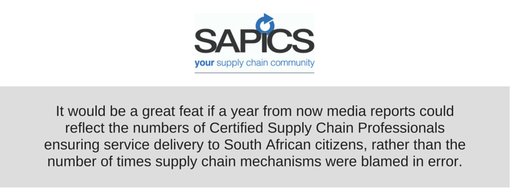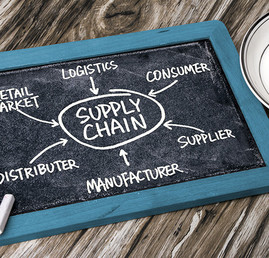|
The supply chain management community of South Africa wants to highlight another critical error made in shifting the blame of the Nkandla scandal to supply chain mechanisms: the correct terminology to use would have been public procurement mechanisms.
The term supply chain describes far more than just procurement. This very specialised profession encompasses all activities needed to deliver the right product or service to the right customer, at the right time, place, and cost. Supply chain management theory delves deep into the efficiencies of sourcing, processing, manufacturing, transporting, storing, distributing, tracking, and returning anything from raw metals to household products sold in retail stores. References to supply chain problems in the public sector as catchall term for public procurement policies that lead to fruitless and wasteful expenditure are not only inaccurate, but dangerous, as it shifts the focus away from the true problem at hand. It is also an insult to highly qualified professionals that ensure on a daily basis that South African consumers have easy access to a wide variety of local and imported products and services that make their lives possible and enjoyable. Managing a supply chain demands an understanding of an entire value chain; all the suppliers that work seamlessly together to ensure that doctors have the necessary machinery to perform life-saving operations, that enjoying fresh seafood is possible even thousands of kilometers away from the sea, and that your online shopping order arrives at a time and place convenient for you. The Western Cape province is an example of public sector organisations that have a solid grasp of the true meaning of supply chain. The proof is evident in an increase in clean audits, exceptional delivery of basic services to its citizens, and a number of other statistics that show that local government can serve with excellence its constituents within the framework of the Public Financial Management Act (PFMA) that set out public procurement – referred to as supply chain – processes. While it can be argued that the matter at hand is one of semantics, something as small as a change in understanding that there is more to supply chain – and content citizens as a results – than just procuring goods and services within a legislative framework. The next step would be to ensure that all civil servant employed in a supply chain capacity are well trained in the theory of comprehensive supply chain management. It would be a great feat if a year from now media reports could reflect the numbers of Certified Supply Chain Professionals ensuring service delivery to South African citizens, rather than the number of times supply chain mechanisms were blamed in error. ENDS Issued by: SAPICS - your supply chain community MEDIA CONTACT: Juanita Vorster, juanita@thatpoint.co.za, www.atthatpoint.co.za For more information on SAPICS please visit: Website: www.sapics.org.za Twitter: @SAPICS01 LinkedIn: SAPICS group Facebook: OperationsManagement
0 Comments
Local supply chain professionals excel in international certification from APICS |
Welcome to the SAPICS Newsroom. For media releases prior to August 2014, please click here.
Archives
January 2017
Categories
All
|



 RSS Feed
RSS Feed